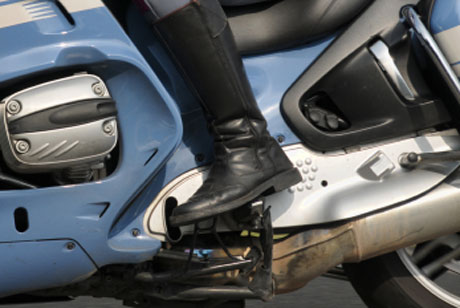Todd: When I was in Thailand I had experiences with bribery, and we don't really have it with government officials in the U.S., but I have to admit I thought it was really convenient, because let's say you are driving and you get a speeding ticket, or you do something wrong, in Thailand you would just pay ten dollars, twenty dollars and the whole incident was forgot. In my culture were brought up to think that that's really bad but I have to admit, I liked the fact that you would pay a little money, and then it was not on your record, because in the United States if you get a speeding ticket, or you do anything wrong then it's on your record, and it's permanent and that can affect your insurance payment and things like that, so it was this really weird feeling where I felt odd doing it, and I felt awkward doing it because it wasn't part of our culture, but at the same time I thought it was almost convenient. Have you ever had experiences like that?
托德:我在泰国时经历过贿赂,美国政府官员一般不接受行贿,不过我要承认,我认为这种方法的确很方便,比如说你驾驶时被开了张超速罚单,或者是因为其他违规行为被开罚单,在泰国你只要付10美元或20美元就可以解决了,这件事就结束了。可是在美国,这种行为被看作是不好的行为,不过我承认,我喜欢这种付点儿小钱然后不做记录的做法,在美国,如果你收到超速罚单,或是有其他违规行为,那就要被记录在案,而且这一记录是永久存在的,可能会影响你的保险偿付,所以,我对贿赂有种奇怪的感觉,因为我接受的文化里没有这种行为,所以我觉得这样做很奇怪,不过同时我认为这种做法非常方便。你有这种经历吗?
Aiman: Well, I have two different experiences. Because in Syria it is pretty different to Dubai, so in Syria for example, you'd have to bribe the police officers even if you didn't do anything because that's how they live. But in Dubai they get really nice wages and they don't need your bribe. For example, once I was eating dates while I was driving. I was speaking on my phone, my mobile phone, and I was not wearing my seat belt, and I was not paying attention, and then the policeman asked me to pull over, and when I did, I didn't even know what was the problem, so when he came to me and said to me, "Can I have the car registration and license?" I said, "Yeah, sure. Please take one date, or a date, while I look for them." And he said, "No, sorry, I can't." And I was so upset with that. I said, "What do you mean you can't? Are you better than me? Is that what you're trying to say?" And he said, "No, It's illegal. I can't. You know what, just go. I don't need anything from you. Please go."
艾曼:我有两种不同的经历。叙利亚的情况和迪拜的非常不同,在叙利亚,即使你没有违规行为,也要贿赂警察,这就是警察的生存方法。但是在迪拜,警察的收入相当不错,他们不需要你的贿赂。举个例子,有一次我一边开车一边吃枣。而且我还在打电话,我当时并没有系安全带,我没有注意,这时警察过来让我靠边停车,我把车停下来以后也不知道出了什么问题,他过来对我说:“请出示你的汽车登记和驾照”。我回答说:“好,我要找一下,我找的时候你吃个枣吧。”他说:“抱歉,我不能吃。”我当时对他的回答非常生气。我说:“你说不能吃是什么意思?你觉得你比我强吗?你就是要说这个吗?”他说:“不是,这样做是违法的。我不能这么做。你走吧。我不需要你的任何东西。请开走吧。”
Todd: So the policeman in Dubai was very straight and honest. He can't accept anything from a driver, and so he turned you down.
托德:迪拜警察正直又诚实。他不能接受司机给的任何东西,所以他拒绝了你。
Aiman: Exactly. Because he turned me down, it is really bad in the Arab culture. He decided to just let me go. Please just go.
艾曼:没错。他拒绝了我,拒绝在阿拉伯文化里是种不好的行为。所以他决定让我直接开走。他说请开走吧。
Todd: Really, so if somebody offers you something in an Arab culture, and you decline that's not polite.
托德:是吗?在阿拉伯文化里,如果有人提供你某样东西,拒绝就是不礼貌。
Aiman: Not polite at all.
艾曼:完全不礼貌。
Todd: Well, that's very good to know. Well, thanks, Aiman.
托德:知道这点非常好。谢谢你,艾曼。
Aiman: Thank you.
艾曼:谢谢。

译文属可可原创,仅供学习交流使用,未经许可请勿转载














